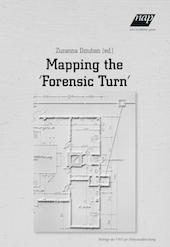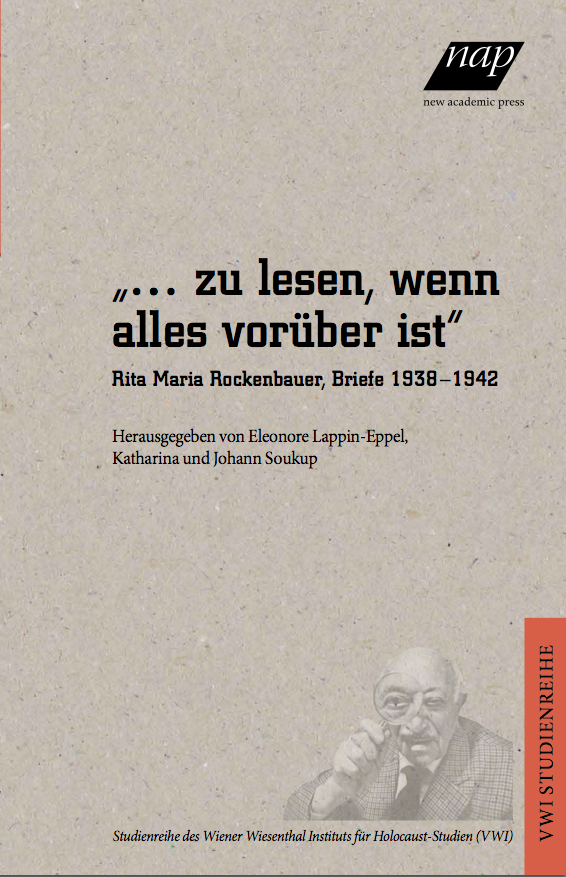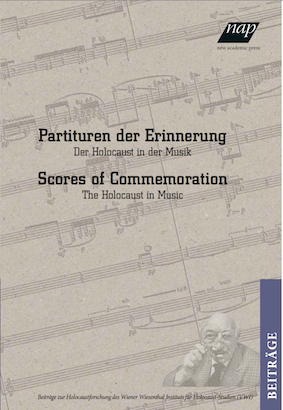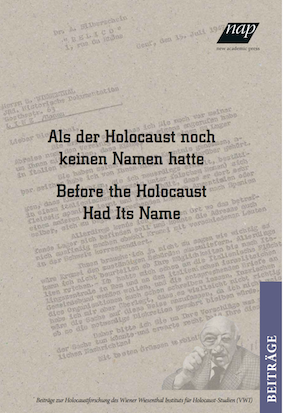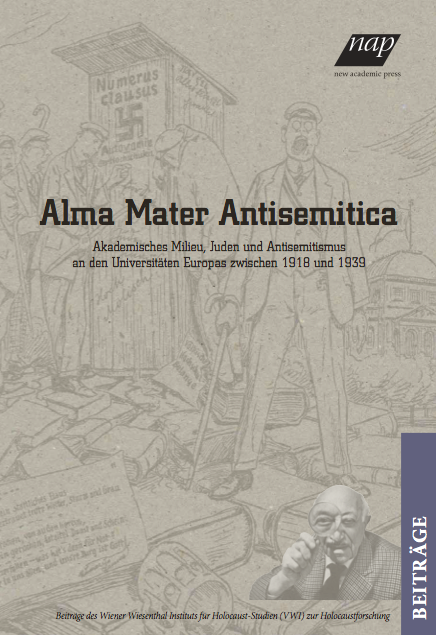 The present article is focused on the antisemitic mindset of several prominent Orthodox clergymen and theologians associated with the Romanian Iron Guard and the radicalisation of Orthodox nationalism under the impact of fascism. During a wave of right-wing ideological radicalisation, Orthodox clergymen and theologians shifted from understanding the Jew according to the patristic theology and canon law to a more confessional, exclusivist trend of theology. It also discusses the Romanian Orthodox Church’s position towards the development of an antisemitic theology and the implementation of this theology during the Holocaust by the Orthodox priests affiliated with the Romanian Orthodox Exarchate in Transnistria.
The present article is focused on the antisemitic mindset of several prominent Orthodox clergymen and theologians associated with the Romanian Iron Guard and the radicalisation of Orthodox nationalism under the impact of fascism. During a wave of right-wing ideological radicalisation, Orthodox clergymen and theologians shifted from understanding the Jew according to the patristic theology and canon law to a more confessional, exclusivist trend of theology. It also discusses the Romanian Orthodox Church’s position towards the development of an antisemitic theology and the implementation of this theology during the Holocaust by the Orthodox priests affiliated with the Romanian Orthodox Exarchate in Transnistria.
Editorial
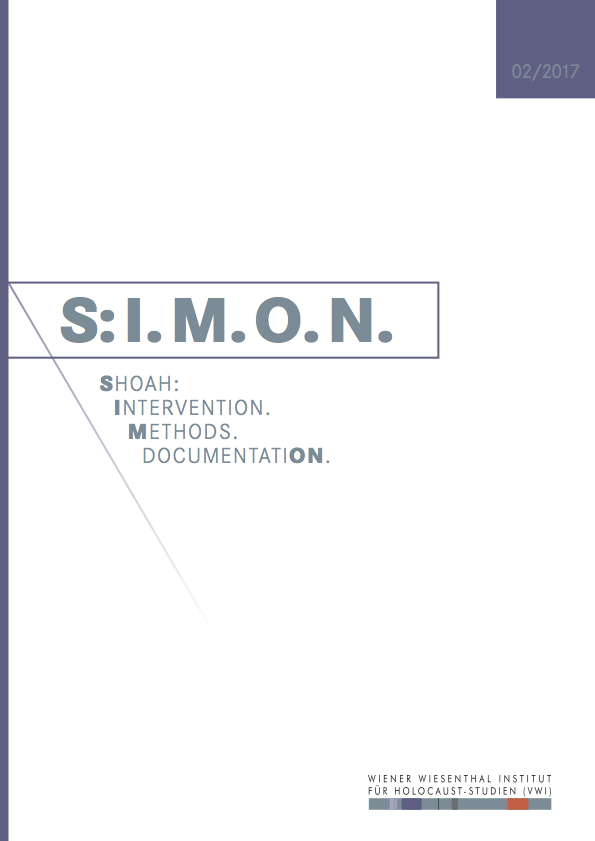 S:I.M.O.N. is an e-journal of the Vienna Wiesenthal Institute for Holocaust Studies (VWI). It appears twice a year in English and German language. S:I.M.O.N. aims at both a transnational and comparative history of the Holocaust and Jewish Studies in Central and Eastern Europe within the broader contexts of the European history of the 20th and 21st century, including its prehistory, consequences and legacies as well as the history of memory.
S:I.M.O.N. is an e-journal of the Vienna Wiesenthal Institute for Holocaust Studies (VWI). It appears twice a year in English and German language. S:I.M.O.N. aims at both a transnational and comparative history of the Holocaust and Jewish Studies in Central and Eastern Europe within the broader contexts of the European history of the 20th and 21st century, including its prehistory, consequences and legacies as well as the history of memory.
S:I.M.O.N. serves as a forum for discussion of various methodological approaches. The journal especially wishes to strengthen the exchange between researchers from different scientific communities and to integrate both the Jewish history and the history of the Holocaust into the different “national” narratives. It also lays a special emphasis on memory studies and the analysis of politics of memory. S:I.M.O.N. uses a double-blind review system, which means that both the reviewer’s and the author’s identities are concealed from each other hroughout the review process.
Shoah: The journal deals with the history of the Shoah from multidisciplinary, transnational and comparative perspectives. It seeks to integrate studies on Jews as well as on other groups of victims of the Holocaust, especially on Roma, and of so far less researched regions of (East) Central and (South) Eastern Europe.
Intervention. The journal reports on research projects and their transmission into public events. It also informs about current educational and remembrance programs.
Methods. The journal serves as a forum for the discussion of methodological approaches as, for instance, the everyday history, oral history, gender history, the history of violence, anti-Semitism and racism and the theory of memory and memory politics.
DocumentatiON. The journal contributes to critical approaches on using and interpreting archival materials in the 21st century.
Download the current issue S:I.M.O.N. 2017/2.
Articles
Alexander Korb
Transformationsgewalt in Europa 1944–1950. Perspektiven auf das Ende des Zweiten Weltkriegs
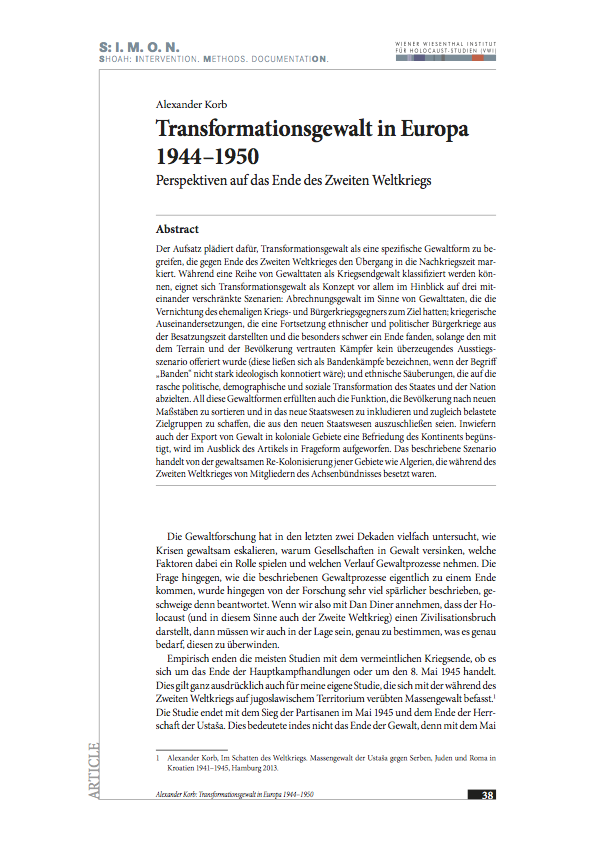 This essay proposes that transformation violence be considered a particular form of violence that marked the transition to the post-war period towards the end of the Second World War. While a series of violent acts can be classified as wartime violence, transformation violence is a useful concept that can be applied in particular to three interlocked scenarios: settlement violence, meaning violent acts that aimed to destroy the former enemy in war and civil war; acts of war that constituted a continuation of ethnic and political civil wars from the occupation era and which were particularly hard to put to an end as long as the fighters familiar with the territory and the population were not given a convincing exit scenario (these might be described as gang wars if the term “gangs” did not carry such a strong ideological connotation); lastly, ethnic cleansing that aimed at a rapid political, demographic and social transformation of the state and the nation. These forms of violence all also had the purpose of arranging the population by new measures and to draw them into the new political system while at the same time creating loaded target groups who were to be excluded from the new political system. Finally, the article raises the question whether the export of violence into colonial territories aided the peacemaking efforts on the continent. It describes the scenario of violent re-colonialisation of territories like Algeria, which had been occupied by members of the axis powers during the Second World War.
This essay proposes that transformation violence be considered a particular form of violence that marked the transition to the post-war period towards the end of the Second World War. While a series of violent acts can be classified as wartime violence, transformation violence is a useful concept that can be applied in particular to three interlocked scenarios: settlement violence, meaning violent acts that aimed to destroy the former enemy in war and civil war; acts of war that constituted a continuation of ethnic and political civil wars from the occupation era and which were particularly hard to put to an end as long as the fighters familiar with the territory and the population were not given a convincing exit scenario (these might be described as gang wars if the term “gangs” did not carry such a strong ideological connotation); lastly, ethnic cleansing that aimed at a rapid political, demographic and social transformation of the state and the nation. These forms of violence all also had the purpose of arranging the population by new measures and to draw them into the new political system while at the same time creating loaded target groups who were to be excluded from the new political system. Finally, the article raises the question whether the export of violence into colonial territories aided the peacemaking efforts on the continent. It describes the scenario of violent re-colonialisation of territories like Algeria, which had been occupied by members of the axis powers during the Second World War.
SWL-Reader
Marianne Hirsch/Leo Spitzer
Spaziergang in der Herrengasse. Straßenfotos aus dem jüdischen Czernowitz
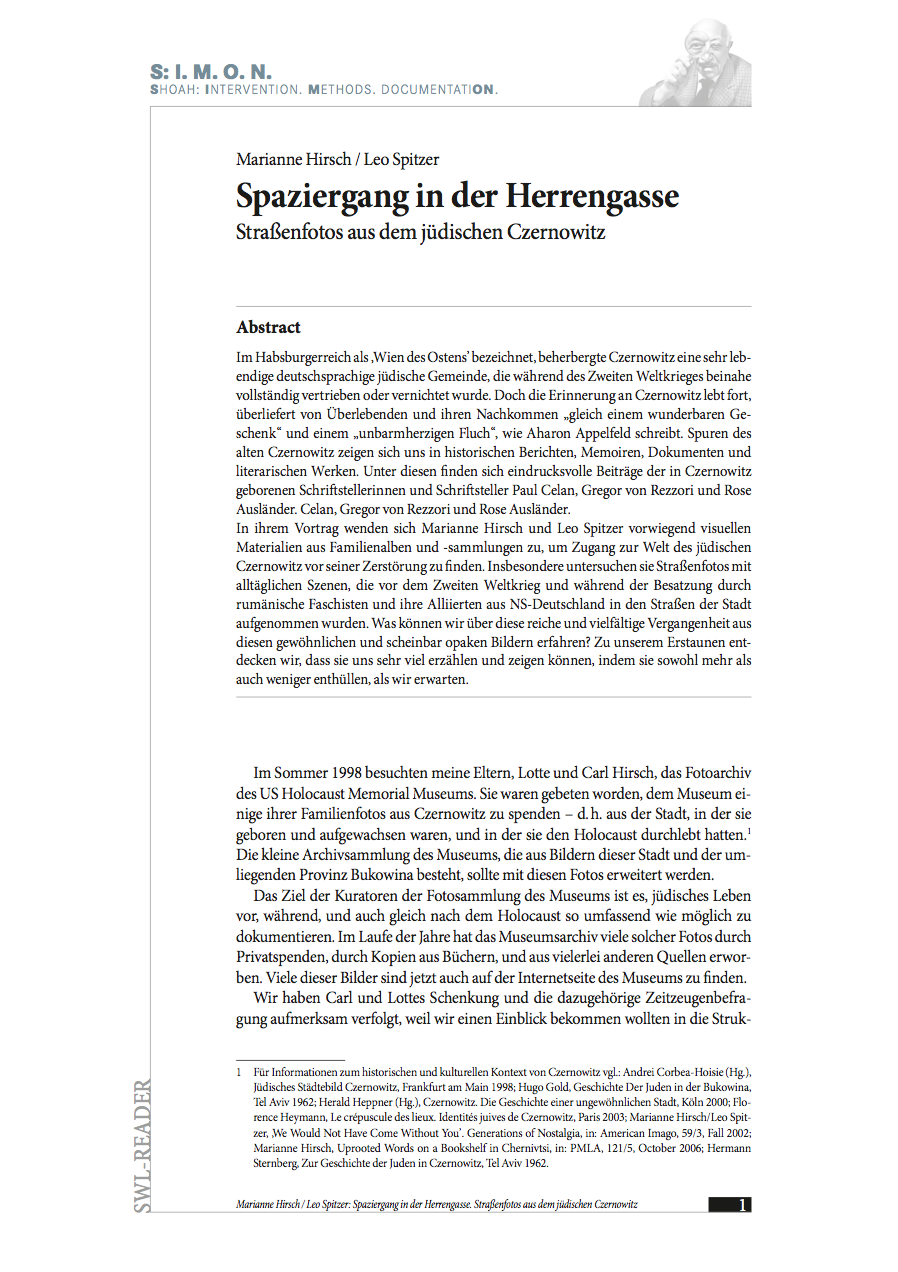 Czernowitz was the Habsburg Empire's „Vienna of the East“; it had a lively German-speaking Jewish community, almost all of whom were persecuted or murdered during the time of the Second World War. Yet the memory of Cernowitz lives on, passed on as it is by survivors and their descendants “like a wonderful present“ and a „relentless curse“, as noted by Aharon Appelfeld. We find evidence of old Cernowitz in historical reports, memoirs, documents and literary works. These include impressive contributions by Cernowitz-born writers.
Czernowitz was the Habsburg Empire's „Vienna of the East“; it had a lively German-speaking Jewish community, almost all of whom were persecuted or murdered during the time of the Second World War. Yet the memory of Cernowitz lives on, passed on as it is by survivors and their descendants “like a wonderful present“ and a „relentless curse“, as noted by Aharon Appelfeld. We find evidence of old Cernowitz in historical reports, memoirs, documents and literary works. These include impressive contributions by Cernowitz-born writers.
In their lecture, Marianne Hirsch and Leo Spitzer focussed primarily on materials from family albums and collections in order to tap into the world of Jewish Cernowitz before its destruction. In particular, they analysed street photographs depicting daily life which had been taken on the city's streets before the Second World War and during the occupation by Romanian fascists and their allies from Nazi Germany. What do these ordinary and apparently opaque images tell us about the rich and diverse past? We were astonished to discover that they tell and show us a lot in that they reveal both more and less than we had expected.
Events
Miloslav Szabó
Ein ‚antislowakischer' Oscar-Film? Zur Darstellung des Holocaust im tschechoslowakischen Film Obchod na korze
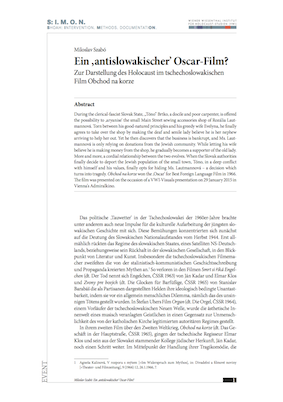 During the clerical-fascist Slovak State, "Tóno" Brtko, a docile and poor carpenter, is offered the possibility to 'aryanise' the small Main Street sewing accessories shop of Rozália Lautmannová. Torn between his good-natured principles and his greedy wife Evelyna, he finally agrees to take over the shop by making the deaf and senile lady believe he is her nephew arriving to help her out. Yet he then discovers that the business is bankrupt, and Ms. Lautmannová is only relying on donations from the Jewish community. While letting his wife believe he is making money from the shop, he gradually becomes a supporter of the old lady. More and more, a cordial relationship between the two evolves. When the Slovak authorities finally decide to deport the Jewish population of the small town, Tóno, in a deep conflict with himself and his values, finally opts for hiding Ms. Lautmannová – a decision which turns into tragedy. Obchod na korze won the 'Oscar' for Best Foreign Language Film in 1966. The film was presented on the occasion of a VWI-Visuals presentation on 29 January 2015 in Vienna's Admiralkino.
During the clerical-fascist Slovak State, "Tóno" Brtko, a docile and poor carpenter, is offered the possibility to 'aryanise' the small Main Street sewing accessories shop of Rozália Lautmannová. Torn between his good-natured principles and his greedy wife Evelyna, he finally agrees to take over the shop by making the deaf and senile lady believe he is her nephew arriving to help her out. Yet he then discovers that the business is bankrupt, and Ms. Lautmannová is only relying on donations from the Jewish community. While letting his wife believe he is making money from the shop, he gradually becomes a supporter of the old lady. More and more, a cordial relationship between the two evolves. When the Slovak authorities finally decide to deport the Jewish population of the small town, Tóno, in a deep conflict with himself and his values, finally opts for hiding Ms. Lautmannová – a decision which turns into tragedy. Obchod na korze won the 'Oscar' for Best Foreign Language Film in 1966. The film was presented on the occasion of a VWI-Visuals presentation on 29 January 2015 in Vienna's Admiralkino.
Ionut Florin Biliuta: Sowing the Seeds of Hate. The Antisemitism of the Orthodox Church in the Interwar Period
„... zu lesen, wenn alles vorüber ist“
Rita Maria Rockenbauer, Briefe 1938 –1942
Wien 2014
Partituren der Erinnerung.
Der Holocaust in der Musik
Scores of Commemoration.
The Holocaust in Music
Wien 2015
Before the Holocaust Had Its Name. Early Confrontations of the Nazi Mass Murder of the Jews
Wien 2016
Akademisches Milieu, Juden und Antisemitismus an den Universitäten Europas zwischen 1918 und 1939
Academic Milieu, Jews and Antisemitism at European Universities between 1918 and 1939
Wien 2016


